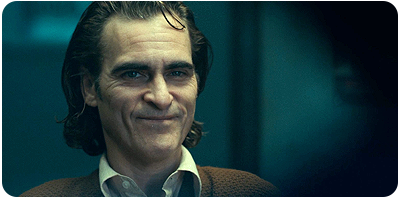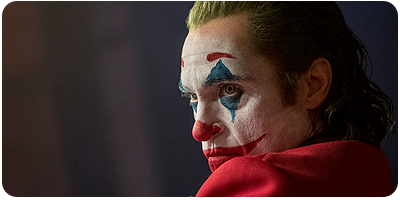
A coal-black, subversively awestruck overhaul of everything which a mass-market, studio-produced comic-book spin-off is capable, "Joker" paints a vision so raw, so singular and ultimately so emphatic it plays like the greatest early-'80s Martin Scorsese picture there never was. And yet, in 2019, here it is, an astonishing high-wire show written and directed by Todd Phillips (2016's "
War Dogs") and co-written by Scott Silver (2016's "
The Finest Hours"). A gritty, aching, altogether chilling character study under the guise of a DC Comics origin story for Batman's future clown-faced foe, this hard-R crime drama genuinely surprises and rattles with the kind of uncompromising relish rarely, if ever, seen before within this particular genre pocket. If Heath Ledger's unforgettable Oscar-winning performance as the Joker in 2008's "
The Dark Knight" felt like the final word on this iconic character, think again; Joaquin Phoenix (2014's "
Inherent Vice") not only put his own personal stamp on it, he takes the role to heretofore unseen places of piercing psychological and emotional torment.

Arthur Fleck (Joaquin Phoenix) suffers from a neurological condition which causes him to laugh involuntarily, often at inappropriate times. It serves him well as a professional clown, but not so much when he is out of his make-up, shuffling through an empty, unhappy life in crime-riddled Gotham City. Residing in a grimy apartment with aging mother Penny (Frances Conroy), Arthur loses himself in his dream of being a stand-up comic and his fantasy of making a splash on the illustrious Murray Franklin's (Robert De Niro) late-night talk show. His imaginings are but a temporary respite, however, from a reality where most people either ignore him or see him as the butt of a joke. It is apparent from the start that Arthur is mentally ill, but he has no one to turn to; when a social worker's company abruptly shutters, he is left without help or access to the medication he needs. His search for an identity suddenly and unexpectedly changes when he rashly guns down three harassers on the subway while returning home from work one night. As headline stories adorn the media about a mysterious unknown clown killer and rumblings of an anti-privilege cult start to form in his honor, Arthur is left to assess a newfound twisted purpose in what he previously saw as a hopeless life.

"Joker" is as unsettling as it is rapturous, an unyielding two-hour peek into a diseased mind. Neither critical nor overtly empathetic, the film sees Arthur in all of his warts-and-all facets. A product of his genetics, heinous upbringing, and a failing mental-health system, but also a desperately sick man capable of inflicting unimaginably brutal violence, he defies simplistic categorization. Wise to never paint him as an idealized anti-hero or a one-note villain, the screenplay non-judgmentally dives deep into his psyche, edging closer in interest before recoiling in horror at his actions. Disappearing inside Arthur's skin and cackle while contorting his emaciated body in ways both monstrous and operatic, Joaquin Phoenix gives perhaps his most formidable performance yet in an acting career of many highlights. Like Robert De Niro's Travis Bickle in 1976's "Taxi Driver," this is a character certain to stick to viewers and not be forgotten. The physical and emotional journey he goes on as he begins to learn about his and his mother's pasts is riveting, yes, but then so much more. Coinciding with a pull toward the infamy his painted persona begins to receive in the news is an increasing pessimism and sense of betrayal over what he views as an uncaring society where the pain and humiliation of others is treated as harmless entertainment. All of this, finally, creates a perfect storm of chaos. The results are harrowing and poignant and thoroughly unnerving, made all the more indelible by Phoenix's momentous turn.

Textured and dynamic, patient and disquietingly vicious, taking itself seriously but then unexpectedly pouncing with bursts of darker-than-dark humor, "Joker" is nothing short of a tour de force. Lawrence Sher's (2019's "
Godzilla: King of the Monsters") lensing mesmerizes, each impeccable shot adding another brushstroke to its sweeping gravelly canvas. The music score by Hildur Guðnadóttir (2018's "
Sicario: Day of the Soldado") and a number of ace soundtrack selections (including Frank Sinatra's "That's Life") make for perfect thickly portentous accompaniment, while Mark Friedberg's (2014's "
The Amazing Spider-Man 2") production design deliciously transforms Gotham City into an era-specific cousin of Manhattan in 1981 (the "
Blow Out" marquee late in the proceedings is a nice touch). What director Todd Phillips so ingeniously achieves here is his marriage of a grown-up portrait of a human being in crisis with the revisionist but still ultimately faithful lore of the "Batman" tale. Arthur's transformation into the Joker, never before seen onscreen before, does anything but strip him of his mysterious aura. Instead, learning about his tortured past and fractured mind only adds complicated and disconcerting layers to his legacy. As all of the awful pieces fall into place, the film thrashes, then exceeds, the loftiest of audience expectations. Where the narrative leads in its intensely disturbing final act has to be seen to be fully believed. Sobering and, yes, shocking, "Joker" creatively invigorates in its sheer unvarnished madness.